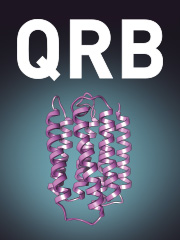Crossref Citations
This article has been cited by the following publications. This list is generated based on data provided by Crossref.
Fernandez, Erik J.
Mancuso, Anthony
and
Clark, Douglas S.
1988.
NMR Spectroscopy Studies of Hybridoma Metabolism in a Simple Membrane Reactor.
Biotechnology Progress,
Vol. 4,
Issue. 3,
p.
173.
Ro¨sch, Paul
1989.
Nuclear Magnetic Resonance Part A: Spectral Techniques and Dynamics.
Vol. 176,
Issue. ,
p.
342.
Ellington, W. Ross
and
Wiseman, Robert W.
1989.
Advances in Comparative and Environmental Physiology.
Vol. 5,
Issue. ,
p.
77.
Kuchel, Philip W.
1990.
Spin‐exchange NMR spectroscopy in studies of the kinetics of enzymes and membrane transport.
NMR in Biomedicine,
Vol. 3,
Issue. 3,
p.
102.
Roberts, Justin K.M.
1990.
Observation of uridine triphosphate:glucose-1-phosphate uridylyltransferase activity in maize root tips by saturation transfer 31P-NMR. Estimation of cytoplasmic PPi.
Biochimica et Biophysica Acta (BBA) - Molecular Cell Research,
Vol. 1051,
Issue. 1,
p.
29.
Skibsted, Ulrik
and
Hansen, Poul Erik
1990.
1H NMR Spin‐echo Spectroscopy of Human Erythrocytes. Transformation of Exogenous Compounds.
NMR in Biomedicine,
Vol. 3,
Issue. 6,
p.
248.
Meier, Joseph E.
and
Marshall, Alan G.
1990.
Biological Magnetic Resonance.
Vol. 9,
Issue. ,
p.
199.
Lundberg, Peter
Harmsen, Eef
Ho, Clinton
and
Vogel, Hans J.
1990.
Nuclear magnetic resonance studies of cellular metabolism.
Analytical Biochemistry,
Vol. 191,
Issue. 2,
p.
193.
Quirk, Philip G.
and
Campbell, Iain D.
1990.
31P and 39K nuclear magnetic resonance spectroscopy studies of halobacterial bioenergetics.
Biochimica et Biophysica Acta (BBA) - Bioenergetics,
Vol. 1019,
Issue. 1,
p.
81.
King, G. F.
and
Boyd, C. A. R.
1991.
Cell Membrane Transport.
p.
297.
Seymour, A.-M.
1991.
Tissue Oxygen Utilization.
Vol. 12,
Issue. ,
p.
16.
Rudin, Markus
and
Sauter, Andre
1992.
In-Vivo Magnetic Resonance Spectroscopy II: Localization and Spectral Editing.
Vol. 27,
Issue. ,
p.
257.
Kaplan, Ofer
van Cohen, Peter C. M.
and
Cohen, Jack S.
1992.
In-Vivo Magnetic Resonance Spectroscopy III: In-Vivo MR Spectroscopy: Potential and Limitations.
Vol. 28,
Issue. ,
p.
3.
Ruiz-Cabello, Jesús
and
Cohen, Jack S.
1993.
Vol. 145,
Issue. ,
p.
1.
KACSER, Henrik
and
ACERENZA, Luis
1993.
A universal method for achieving increases in metabolite production.
European Journal of Biochemistry,
Vol. 216,
Issue. 2,
p.
361.
Brindle, Kevin M.
Fulton, Alexandra M.
and
Williams, Simon‐Peter
1993.
Enzymology in vivo using NMR and molecular genetics.
Journal of Molecular Recognition,
Vol. 6,
Issue. 4,
p.
159.
Zupke, C.
and
Stephanopoulos, G.
1994.
Modeling of Isotope Distributions and Intracellular Fluxes in Metabolic Networks Using Atom Mapping Matrices.
Biotechnology Progress,
Vol. 10,
Issue. 5,
p.
489.
Cullen, William R.
and
Hettipathirana, Deepthi I.
1994.
Application of whole cell NMR techniques to study the interaction of arsenic compounds with catharanthus roseus cell suspension cultures.
Applied Organometallic Chemistry,
Vol. 8,
Issue. 5,
p.
463.
Brindle, Kevin M.
Fulton, Alexandra M.
and
Williams, Simon-Peter
1994.
NMR in Physiology and Biomedicine.
p.
237.
Kuchel, Philip W.
Kirk, Kiaran
and
King, Glenn F.
1994.
Physicochemical Methods in the Study of Biomembranes.
Vol. 23,
Issue. ,
p.
247.


